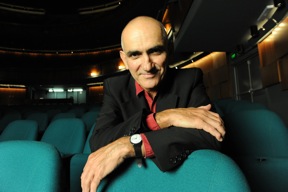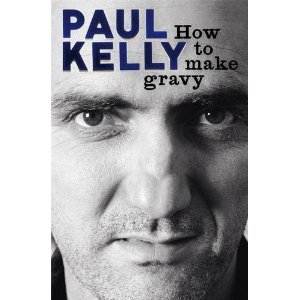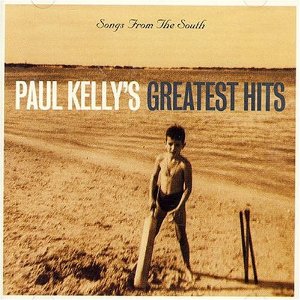
photo credit: Tony Mott
A Conversation with Paul Kelly
Mike Ragogna: Paul, how are you?
Paul Kelly: I'm doing well, sir. Thanks.
MR: Paul, you are a well known and highly respected songwriter all over the world, but not necessarily in the United States. What are your thoughts about your music having been somewhat elusive to American audiences?
PK: That's unfortunately out of my hands, you know? I've been writing since I was 21 and I knew then that I was never really going to have a career. I actually started playing music to avoid having a career, so I don't really make plans like that. Once you write them and record them, it's sort of out of your hands. After that, it's not up to you.
MR: Is the perception true that there's a strong camaraderie between musical acts that come out of Australia?
PK: I'm from Melbourne and we have a really strong musical community there. There's always been a sort of great cross-pollination between bands because I play with a band and I've also got a squad of musicians I play with. So, I think there is a sort of support for each other. We also come from a small country, so when we run into each other outside of Australia we're always pretty happy to see each other, you know?
MR: Yeah. So, what goes into your creative process when writing a song?
PK: It's like I'm doodling, really. I'll come up with something and play it on my guitar, then I'll add some sounds to that. From there, I'll just go on and add some words to the sounds. It's sort of like a kid playing with paints, you know? Just playing with things until it all comes together.
MR: Do you ever find yourself getting randomly inspired and drop what you're doing to write?
PK: Well, sometimes, you hear or say something that you realize could be good in a song and if I get a chance, I usually write it down. I try to carry a pen and paper with me, but I don't always have it. (laughs) But as far as writing songs, I think you just have to make time for it. When you've got some days free, you don't answer the phone or the doorbell, and just stick to it. Maybe nothing will happen for a few days, but if you're lucky, you'll create a song. But, you do find those little scraps along the way that you can sort of look at later on.
MR: Your Songs From The South - Greatest Hits album chronicles your music from 1985 through 2008. Do you have any favorites from these tracks?
PK: Look, when it comes to that question, I just refer to Duke Ellington because once, when I asked him what his favorite song of his was, he said, "The one I'm working on." What's good enough for the Duke is good enough for me. (laughs)
MR: Very nice. Speaking of working on songs, are you working on anything new right now?

PK: Yes, finally. I wrote a book called How To Make Gravy which sort of stopped my songwriting for three years. The book has since come out, and is going to be released in the US as well. We'll have the book for sale on the road as well. I'll start writing songs again once the book stuff is all done. The name of the book is also the title of a song that I wrote, and it also comes with a box set of CDs of 100 songs that I did over a series of 4 shows.
MR: You're currently touring in support of this new album and the book?
PK: Yeah.
MR: Nice. Speaking of touring, do you prefer live performance or recording more?
PK: Well, I feel like they sort of balance each other out. I like playing live, but I like being in the studio a lot as well. Most of the stuff I record in the studio is pretty live anyway.
MR: What are some of your thoughts when you look back on your very large body of work?
PK: Well, really, all I try to focus on is writing the next song. I don't really listen to my own music much, but playing the songs live on tour is a way for me to look back on them. Also, when I look back on all the music during a tour, I sort of lose the chronology of all of them. The best songs for me are the ones that I wrote that I can still play. After a while, the songs just become travel companions. You just take them along with you when you go -- they're like the tools that you need to do your work. You take them with you and then pull them out and let them do their job. I don't think about the records anymore, it's just a collection of songs that come with me on my travels.
MR: Nicely put. Do you ever find that the songs change and evolve while you're on the road?
PK: Yeah, I think it's just like anything that you change over the years and you might not even know it's changed. You may hear a song that you recorded five years ago, and realize that over the year the way you play it has changed. Some songs, you might be playing and no longer connect with them, so you have to give them a rest. Other songs come back around and may almost seem prophetic when you're playing them years later. (laughs)
MR: (laughs) Nice. How would you say the music industry differs between the United States and the rest of the world? Do you see a distinct difference between the two?
PK: That's a good question. I don't know. We get to hear music from all around the world and not just geographically, but the way people listen to music these days also jump back and forth in time. I think the idea of a particular artist coming out with a particular album was a big thing, that you go down and wait for at the record store. But times have changed. The way that my children buy music now is so different -- the just have a large collection from The Beatles to Vampire Weekend in their collection. They just have a collection of whatever they love and the time and origin of the music doesn't really matter.
MR: Speaking of music all around the world, you have an American tour coming up.
PK - HTMG from 1888 Media on Vimeo.
PK: Yes, actually. We flew in, for some reason, on the 10th anniversary of the September 11th attack and we started in Chicago on September 12th. It's a shorter two week tour, and we'll be spending two nights in Chicago, Vancouver, Toronto, Los Angeles, and New York, then we're heading back home. The shows that we'll be doing will be a sort of short version of the "A to Z" shows -- over each of the two nights in each city, I'll be doing a total of 50 songs in alphabetical order starting off with "Adelaide," which is the name of my hometown.
MR: That's beautiful. Musically, do you find that the show still works well going from "A to Z" like that?
PK: You know, it actually does. I mean, you can't really do much about the songs and the letters at this point. (laughs) I sometimes slide the letters around, so it's not always strictly alphabetical, but it is by letter. And I don't use a lot of chords, so the same chords just keep coming around and around.
MR: (laughs) That's great. Will you be giving us any glimpses of the book at the shows?
PK: Well, yeah. There's a bit of story telling at the shows. Most of the stories are the ones that led to the book, so it's all connected.
MR: Nice. Do you have any advice for newer artists?
PK: Well, I would say never sign a contract without a lawyer.
MR: Very good advice. Was this advice that you had to learn the hard way?
PK: No, nothing really happened in particular. I think it should just be common sense to know that you should have lawyer present when you sign something. I think things are a bit harder these days because of technology. People are able to make their own records without worrying about the cost of a studio, you can get your music out there without having to go through a major record company, you can find like-minded people around the world who are interested in what you do -- I think that's all great. The problem with it being so easy to make records is that everyone is making records. There's a whole lot of noise out there, so if you want to get noticed, it's quite a bit harder. I think for the most part things are better now than they were, but they're still hard.
MR: Indeed. Any last words of wisdom from a great songwriter?
PK: (laughs) Not really. If I knew how to write a song, I'd write one every day. Songwriting is likeplaying an instrument, you've got to tune up every day. And you don't always catch the fish. (laughs)
MR: (laughs) Nice. Well, thank you so very much for taking time out before your sound check to chat with us, Paul.
PK: Thanks, Mike. Thank you so much for having me.

Tracks:
1. From St. Kilda To Kings Cross
2. Leaps And Bounds
3. Before Too Long
4. Darling It Hurts
5. Look So Fine Feel So Low
6. Dumb Things
7. To Her Door
8. Bradman
9. Everythigs Turning To White
10. Sweet Guy
11. Careless
12. Winter Coat
13. From Little Things Big Things Grow
14. When I First Met Your Ma
15. Pouring Petrol On A Burning Man
16. Love Never Runs On Time
17. Song From The Sixteenth Floor
18. Deeper Water
19. Give In To My Love
20. How To Make Gravy
Transcribed by Evan Martin

A Conversation with Lisa Hannigan
Mike Ragogna: Hello, Lisa.
Lisa Hannigan: Hello, how are you?
MR: I'm very fine, how are you?
LH: I'm very well--I'm enjoying the rare sunshine that we're having in Dublin this afternoon.
MR: You're in Dublin?
LH: I am, I am.
MR: Sweet. Okay, you have a new album called Passenger, which we'll get to immediately. But Lisa, you were on The Colbert Report. Did I mention you were on The Colbert Report?
LH: I was, I was--it was an absolute treat and an honor, to be honest. What made it so special was how lucky it was that we were on it. I think Stephen Colbert was looking up Sean Hannity or something on YouTube and there was a little song there in the corner of me, because obviously my name is only a few letters different. He thought that it looked sort of interesting, so he watched the video of myself and my band playing a song in a pub and he said, "Who are those people? Maybe they'd come on the show." We happened to be on tour in the U.S. at the time, so we swung by. It was such a treat...wow.
MR: What was it like on the set with him?
LH: I hope I'm not giving away any trade secrets, but he was just the nicest man ever. He was amazing. It was very interesting to see the show develop over the course of the day, you know, from when they start and they have their first run through. Just to see how it sort of is knocked into shape and is changed and polished over the course of a couple of hours, and then bam--there it is in the evening, perfectly done. It's an incredible feat that they do every day there.
MR: Do they have, like many live shows do, a warm-up guy?
LH: Yeah, although I was probably a little too nervous to be paying much attention. I'm sure I was just shaking, slightly, backstage...quaking in my boots. (laughs)
MR: (laughs) Let's talk about your previous album, Sea Sew. What are your thoughts looking back at that album?
LH: Well, because it was my first solo record, there was so much learning involved in doing it, and the songs came out in a really mad sort of time of change and flux. So, in my mind, it's quite all over the place, just in terms of theme and what the songs are about because it was such a mad time. I think this record is a much more cohesive body of work, and it's so hard to look back on things that you've done before--I think anybody looking back on stuff they've done just says, "Wow. I see." (laughs) It's quite a difficult thing.
MR: It comes really close to being a concept album, starting with my favorite song on the album, "Home." The songs on this album were written on the road, and it seems, perhaps, to have that longing to be home at certain points.
LH: Yeah. A lot of them were written on the road, and I suppose that definitely instilled the songs with a sense of nostalgia, really, for both home and also--with some of the songs--a period of innocence as well. There's definitely a lot of mention of home, but then also the idea of home as a feeling as well. A lot of the songs are about that, yes. It's weird...being away from home does sort of bring you into sharper focus, really.
MR: Joe Henry is an incredible producer, and he worked with you on this project. What were the dynamics with him were like in the studio.
LH: Oh, I mean, he is just an absolute wonder. He really is amazing. I was very lucky to meet him, and I just knew straightaway that he was the man for the job. He has an incredible, quiet confidence and elegance about him, and he really steered the record in the right way. We ended up going to sort of a converted farmhouse place in Wales in the depths of winter, and Joe came over from L.A. wrapped up very warm, and we made the record in a week--mostly in Wales, and one day in London. It was a wonderful experience. It was a very relaxed experience, considering how short it was. There was a lot of whiskey and wine and strong coffee drunk, and we had regular meal times--it was all very civilized and relaxed, and with a lot of pondering over dinner and in the farmhouse discussing what we had done for the day. It was just a beautiful, relaxed experience. We really just had the most grown-up summer camp that you'd ever imagine...or winter camp, it was more like. But we recorded it pretty much live, so everyone was in the room together and we would do two or three or four takes, and then Joe would say, "Yeah, I think that's the one," and then we would work on that a bit. So, it was really a very natural sort of experience, there wasn't too much frothing on the knobs. Records sometimes can be difficult in that way, but it was a very organic and relaxed experience. It was wonderful.
MR: That all seems like the appropriate way to approach your music. What a nice combination the two of you were.
LH: Oh, it was such a gift that I got to meet him.
MR: Another one of my favorite songs on this album is "O Sleep," on which you have Mr. Ray LaMontagne. I want to say his name over and over because it sounds so great.
LH: Oh, yes, a beautiful name for a beautiful voice. He's such a wonderful man, such a wonderful singer. I always wanted a duet on the record, like a proper duet, where people are singing to each other, not just doing harmonies. I thought to myself, "Who would I really love to sing with?" and Ray was at the top of the list. So, I asked him, thinking, "He probably won't be able to or be around," and the day that we were doing our over-dubs in London--which is just putting down the strings and the horns--Ray had a day off. He had a gig the next day, I think, in London. We nabbed him and he just came in and his voice was stunning. And it sounds great. It was such a treat.
MR: Lisa, what's your creative process like?
LH: Well, I find the blank piece of paper quite a negative force upon working. It's a little oppressive, the blank piece of paper. So, I tend to be wandering about humming, like a mad person. And often, I will go for big long walks and just be mumbling to myself melodiously, and then when I've got something solid, I just record it in my phone or scribble it on the back of a napkin or something, just so I don't forget them. Often, I come home and figure the chords out later, and then with some other ones, I'll be sitting down messing with the guitar or the harmonium or something and start a melody. But it usually ends up at some point with me wandering around like a loon.
MR: Lisa, this album--from top to bottom--is very personal. What is the most personal song to you?
LH: I would say "Little Bird" or "Paper House." They were initially the most difficult to sing in front of people, but over the course of the time that I've been playing them live, they've actually become my favorites to sing. Initially, they felt a little too personal, even though they're probably not massively personal to people listening. I certainly found those quite difficult.
MR: I think my favorite lyrics on the album are from "Little Bird": "Your heart sings like a kettle, and your words, they boil away like steam."
LH: (laughs)
MR: Lisa, what advice do you have for new artists?
LH: Oh, wow--I don't know. I think, really, you just have to work really hard at what you do. It's a very long journey, I think, becoming a songwriter or a writer of any kind. You're never at the end. I have so far to go with being a songwriter, and I'm excited about it. You can't be put off by the obstacles in your way. It's life-long path that you've chosen, and it's important not to be disheartened.
MR: Nice. Now, Herbie Hancock put you on his The Imagine Project, on "The Times, They Are A-Changin'."
LH: Yeah, I'd met Herbie a few years before that. Myself and Damien Rice had done a song on another record that he'd done, and we got on really well. He's such a lovely man, and we just got on really well. And then, yeah, he wanted me for The Imagine Project. It was wonderful. I went over to his house and I tackled "The Times, They Are A-Changin'," which is pretty daunting in itself. You know, anything Herbie Hancock asks me to do, I'll say yes. (laughs) It was a daunting thing to get involved with, but it worked out very well. He's wonderful. I came over to L.A., actually, to do his 70th birthday party at the Hollywood Bowl, which was an incredible experience.
MR: Was Joni Mitchell there?
LH: She wasn't, no. I would've lost my mind if she'd been there.
MR: I do have to say, there are moments when I listen to your music and I hear the artistic essence of where she came from.
LH: Well, that's a great compliment. Thank you very much. My mother was a massive Joni Mitchell fan when we were growing up, and it was one of the main tapes that were in the car for those big, long journeys on summer holidays. So, I'm a huge fan of Joni's--she's amazing.
MR: I'm also a huge Herbie Hancock fan, and I wanted to mention how great your appearance also was on his Possibilities album.
LH: He's such a wonderful way of being--he really puts a smile on everybody's face.
MR: What's got your eye in the papers recently around the world? I know you're in Dublin, and it wouldn't be appropriate to ask you about American politics, but is there anything around the globe that's concerning you right now?
LH: Well, in Ireland, obviously, we're going through a severe economic crisis at the moment, and that's really affecting everyone that you meet all day long when you're walking around Dublin city. So, that's definitely at the forefront of everybody's minds here at the moment.
MR: It seems like the whole world is going through it. You can really see, for the first time, that it's the world's problem, it's not just our economy.
LH: Everyone's economy is pretty dismal at the moment. Yeah, it's definitely not just you guys. We're all in this together.
MR: Yeah, yeah we are. And that's the point people are missing as they're doling out the blame. Anyway, is there anything else about Lisa Hannigan we need to know?
LH: Um, I... don't know. (laughs) I find driving uphill really unpleasant. I've got such a strange sense of vertigo. That's something I've never told anyone before. (laughs)
MR: You heard it here first! Lisa Hannigan's faux-vertigo.
LH: Yeah, it's very weird--it's a secret.
MR: Will you will be touring here in the states, yes?
LH: Yes, I'm coming over in the next couple of weeks and starting on the 27th in Los Angeles, and then working my way across to New York on the 21st of October, with lots of places in between. The website is www.lisahannigan.ie if anybody would like to come and see.
MR: Lisa, all the best, thank you so much for your time.
LH: Thanks, Mike.
Tracks:
1. Home
2. A Sail
3. Knots
4. What'll I Do
5. O Sleep
6. Paper House
7. Little Bird
8. Passenger
9. Safe Travels (Don't Die)
10. Nowhere to Go
11. Flowers
Transcribed by Claire Wellin
